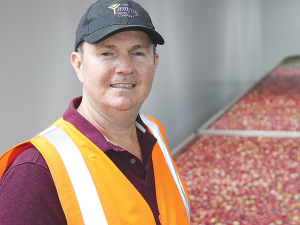Early drought fears ease in Hawke’s Bay, but caution remains
Fears of a serious early drought in Hawke’s Bay have been allayed – for the moment at least.
 General manager of the Yummy Fruit Company, Paul Paynter, says they have been having a magnificent growing season.
General manager of the Yummy Fruit Company, Paul Paynter, says they have been having a magnificent growing season.
Just on two years ago Cyclone Gabrielle wreaked havoc in Hawke's Bay causing massive damage to NZ's largest apple growing region.
The impacts of that storm are far from over and are set to change the viability of businesses and lives of many people.
But this season the general manager of the Yummy Fruit Company, Paul Paynter, says they have been having a magnificent growing season. He says they had an unusually dry, warm spring and so fruit quality looks excellent.
"We couldn't be happier," he told Hort News.
He says they have been picking their first apples for the season, in their case SweeTango, an early variety developed by the University of Minnesota in the US. It gets its name because of its flavour profile, which is equal parts sweet and tangy with hints of fall spices and vibrant acidity. On the outside, SweeTango is blush with hints of deep red and subtle hues of yellow.
Paynter says because the season has been so good, they have been picking these apples a week earlier than usual. But there is just a small problem: despite being such a good growing season, the fruit size is a bit smaller than normal.
"I don't understand the reasons for this and it's disappointing given that we have had such good growing season," he says.
In terms of markets, Paynter says the market will be Asia and it will be Asia forever. He says the bottom has dropped out of the US market due to an oversupply of local fruit there, which has depressed prices. He says at one stage the US was one of their biggest markets but it's hardly worth selling there now.
"Asia has been our biggest market over the last couple of years, taking about 75% of our exports, and China is the single largest. But we don't want it to be too big because something could go wrong," he says.
Despite that caution, Paynter is very positive about the Chinese market, having been there recently. He says while people say the annual growth rate there is only 5% annually, they need to realise that NZ and many other countries would be more than happy if their country had a 5% growth rate.
"The place is buoyant and booming and their type of economic slowdown is our type of economic boom," he says.
As well as apples, the Yummy Fruit Company grows stonefruit and these trees have suffered both short and long term damage from Gabrielle.
Paynter says they are 40% down on stone fruit production this year. He says while apples are more resilient to rain, stone fruit like arid conditions and certainly don't like being partly submerged in floodwaters as they were with Gabrielle.
He says many stone fruit trees continue to die because of the cyclone. Paynter says the rains that hit Hawke's Bay over summer also affected fruit quality causing some stain on fruti and other fruit to shrivel. He says the weather has been the best for picking stone fruit and he says some cherry growers in Hawke's Bay have been hit in a similar way.
Legal controls on the movement of fruits and vegetables are now in place in Auckland’s Mt Roskill suburb, says Biosecurity New Zealand Commissioner North Mike Inglis.
Arable growers worried that some weeds in their crops may have developed herbicide resistance can now get the suspected plants tested for free.
Fruit growers and exporters are worried following the discovery of a male Queensland fruit fly in Auckland this week.
Dairy prices have jumped in the overnight Global Dairy Trade (GDT) auction, breaking a five-month negative streak.
Alliance Group chief executive Willie Wiese is leaving the company after three years in the role.
A booklet produced in 2025 by the Rotoiti 15 trust, Department of Conservation and Scion – now part of the Bioeconomy Science Institute – aims to help people identify insect pests and diseases.